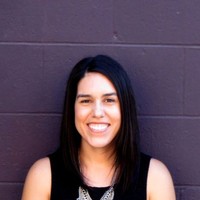
This post was written by Alicia Zuniga (@aliciazuniga), who received an ARL+DLF Fellowship to attend the 2018 Forum.
Alicia Zuniga is the Media Library Specialist for the California Tobacco Control Program where she researches and substantiates the program’s statewide media campaigns and has been tasked with implementing an internal digital library.
She is passionate about communicating scientific findings to the public in an accessible and engaging way. Her main interests include metadata, open access, and science and scholarly communication. Her previous roles include Web Coordinator for Sacramento Public Library, Senior Publications Assistant at the open access publisher, Public Library of Science, and Information Officer for the California Department of Public Health’s 2017 website redesign. She received her MLIS from San Jose State University.
I am so thankful to have been able to attend the 2018 DLF Forum as an ARL+DLF Forum Fellow. When I reflect on the most thought-provoking moment of the forum, the opening plenary speech by Anasuya Sengupta is the obvious answer (if you didn’t get a chance to see it live, be sure to check out the recorded livestream). One of the concepts that stood out for me was her endorsement of Wikipedia as a tool to find secondary sources. I have spent countless amounts of time trying to convince my peers outside of library science that Wikipedia is a valid source of information to use as a starting point in research. The cautions of Wikipedia that were firmly ingrained in us during middle and high school, and even college, were shaken out of me during my graduate studies, but for most others my age the belief that Wikipedia is inaccurate still prevails. This notion persists, despite the fact that even Google, the trusted confidante of our most embarrassing questions, relies in part on Wikipedia data for the Knowledge Graph in their search results.
Sengupta stated that Wikipedia should be viewed with the same lens of both caution and potential as anything else we find on the internet. The public is so quick to regard community-driven information sources like Wikipedia with skepticism, but will retweet an article having only read the headline on social media in a heartbeat. The evaluation part seems to be missing in our information consumption these days, or it is applied unevenly across news sources. While I don’t agree that anyone should cite Wikipedia directly, it’s a great place to find secondary sources in the references. Subject matter experts can also determine what critical information is missing and contribute to the growing corpus of crowdsourced information themselves.
Sengupta’s talk emphasized that the information on Wikipedia is only as strong as the diversity of individuals who contribute to its creation. As part of a public health organization, we have a responsibility to make sure that the health information in Wikipedia is the most up-to-date and supported by robust research.
One of the ways that I have been inspired from this talk was a renewed energy to put toward organizing a Wikipedia edit-a-thon in my own program and our partnership organizations. Sengupta’s talk emphasized that the information on Wikipedia is only as strong as the diversity of individuals who contribute to its creation. As part of a public health organization, we have a responsibility to make sure that the health information in Wikipedia is the most up-to-date and supported by robust research.
Being afforded the opportunity to attend this conference is something I do not take for granted. As the only staff member in my program with any library responsibilities, it is easy to feel disconnected from the world that I had become so entrenched in as a graduate student and Spectrum Scholar. Being able to connect at conferences like this reinvigorates my passion to our field.
Want to know more about the DLF Forum Fellowship Program? Check out last year’s call for applications.
If you’d like to get involved with the scholarship committee for the 2019 Forum (October 13-16, 2019 in Tampa, FL), look for the Planning Committee sign-up form later this year. More information about 2019 fellowships will be posted in late spring.
